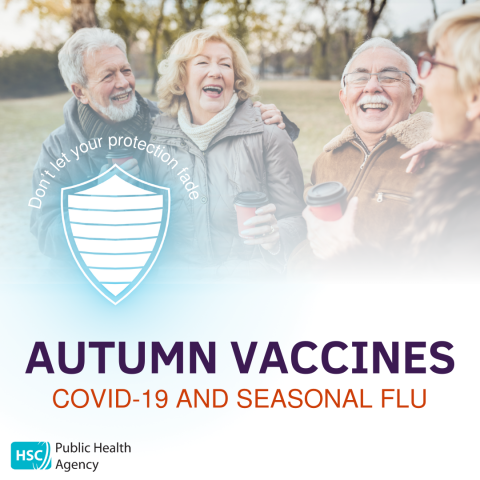Vaccination is the best defence against COVID-19 variants

Following publication of the latest data in the COVID-19 Epidemiological Bulletin, the Public Health Agency (PHA) is reminding everyone that vaccination remains the best defence against emerging variants.
The variant BA.2.86 continues to spread in the UK, with cases identified in most regions, and the latest data (6 October) from the PHA show a small number of cases provisionally identified in Northern Ireland.
The UK Health Security Agency (UKHSA) has reported that the early indications are that BA.2.86 is no more likely to evade existing antibodies than XBB.1.5, another variant that has been circulating widely in the UK. The situation continues to be kept under review, as more data becomes available nationally and internationally.
Dr Declan Bradley, Deputy Director of Public Health at the PHA said: “The SARS-CoV-2 virus, which causes COVID-19, is constantly evolving, with new variants arising frequently. Although only a small number of cases of BA.2.86 have been provisionally identified through genomic sequencing, it is likely that there have been more cases in the community already, as only a limited number of people who have COVID-19 get tested. However, evidence to date does not indicate that BA.2.86 causes more serious disease or is more easily spread than other recent variants that have been in circulation.
“Nevertheless, this is another reminder that the SARS-CoV-2 virus continues to change and that vaccination remains a vital defence against it.”
Following the identification of the new COVID-19 variant, the PHA took the precautionary decision, in line with the rest of the UK, to bring forward the start date of this year’s autumn flu and COVID-19 vaccination programmes to 18 September 2023.
Rachel Spiers, Immunisation and Vaccination Programme Manager at the PHA, said: “The vaccination programme began last month here in Northern Ireland. Vaccines are the best defence against COVID-19 and flu. They provide good protection against hospitalisation and death. If you’re eligible for vaccination you should take up the offer as soon as you are invited.”
People who are eligible for vaccination should make themselves aware of their own GP surgery’s, community pharmacist’s or trust’s vaccination arrangements. Some people may be offered the flu jab and COVID-19 vaccine at the same appointment. It is safe and effective to receive it in this way.
Everyone should be mindful of the steps they can take to reduce the spread of winter illnesses. In addition to getting vaccinated if you are eligible, if you have symptoms of a respiratory infection, you are advised to avoid coming into unnecessary contact with other people to reduce your risk of infecting them, ‘catch it, bin it, kill it’ by carrying tissues, using them to catch a cough or sneeze, and disposing of them immediately, and wash your hands thoroughly and regularly with soap and water and use hand sanitiser.
Those eligible for HSC flu vaccine in 2023/24 are:
- all preschool children aged two to four years on 1 September 2023;
- all primary and secondary school children (up to and including year 12);
- those aged six months to under 65 years in clinical risk groups (as defined by the influenza chapter in ‘Immunisation against infectious disease’ (the ‘Green Book’) – www.gov.uk/government/publications/influenza-the-green-book-chapter-19
- all those aged 65 years and over on 31 March 2024;
- pregnant women;
- those in long-stay residential care homes;
- carers;
- close contacts of immunocompromised individuals;
- frontline health and social care workers.
Eligible groups for COVID-19 vaccine in 2023/24 are:
- residents in a care home for older adults;
- all adults aged 65 years and over;
- persons aged six months to 64 years in a clinical risk group, as laid out in the ‘Immunisation against infectious diseases’ COVID-19 chapter (the ‘Green Book’), including pregnant women – www.gov.uk/government/publications/covid-19-the-green-book-chapter-14a
- frontline health and social care workers;
- persons aged 12 to 64 years who are household contacts (as defined in the Green Book) of people with immunosuppression;
- persons aged 16 to 64 years who are carers (as defined in the Green Book) and staff working in care homes for older adults.
Further details on the winter vaccination programme can be found at www.nidirect.gov.uk/wintervaccines
- The PHA and the Department of Health work with UKHSA as part of UK-wide monitoring of the virus and variants. The latest published data, detailed in the COVID-19 Epidemiological Bulletin for Northern Ireland contain information on detections of variants and are published weekly. www.pha.site/covid19bulletin
- The latest variant report published by UKHSA provides further information about novel SARS-CoV-2 variants including BA.2.86 – www.gov.uk/government/publications/investigation-of-sars-cov-2-variants-technical-briefings
